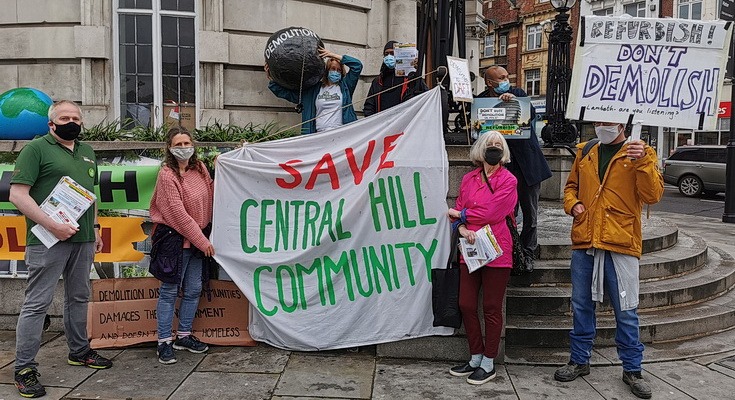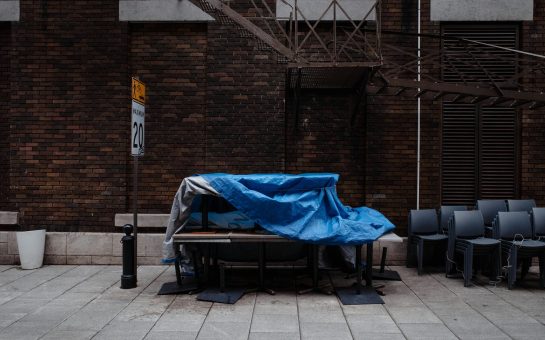Lambeth Council is looking to secure funding for the demolition of a block of flats on an estate in Norwood, despite residents’ environmental and welfare concerns.
The council claimed that the regeneration of Central Hill estate, along with five other estates in the borough, will reduce pressure on housing and help to ease the housing crisis.
Residents said they expect more than half of the new homes to be sold privately at market-level prices, raising questions over whether the project will truly tackle the issue.
Many opponents, including Green Party councillor Pete Elliott, have condemned the treatment of both the permanent and temporary residents on the estate.
Elliott claimed that since the plans were confirmed in 2017, the council have worn down the estate, creating conditions that were not inevitable but, once in place, justified the regeneration project by suggesting the estate is beyond repair.
Sabine Mairey, who has lived on the estate for 20 years, said: “The council have run down the estate physically and verbally, and they’ve run down the community.”
In addition, a report circulated at a council meeting last month noted: “Lambeth’s ambitious regeneration programme will not deliver new homes for some time, and in the meantime there is a short-term impact on supply as properties are emptied ahead of development.”
Whilst current permanent residents will have claim to one of the new homes, opponents argue residents – both permanent and temporary – have been ignored, while the council looks to create more high-end private homes for sale.
A spokesperson from Lambeth Council said: “The proposals for Truslove House, on Roman Rise, which received planning permission in October 2020, are vital to our work to provide more affordable housing on the Central Hill estate.
“They will replace a seven bedroom hostel with 31 new affordable family homes – 22 at council level rent with the remainder shared ownership. Three will be family sized homes adapted for wheelchair users.
“These proposals are a perfect example of the efforts being made by the council to ensure that many more Lambeth residents have the opportunity to live in a good quality home that is affordable and suitable for their needs.”
Across the whole estate, the 320 council homes will be re-provided, with the council claiming that the total number of additional properties will be decided in the ‘master planning’ stage.
A consultation in 2016 shows that 55% of the council tenants at Central Hill supported rebuilding, although figures were lower for leaseholders.

Homes here are now exempt from adaptations, and a resident at Central Hill recently requested staircase adaptations following a stroke, and was told he must instead move off the estate.
Mairey also referenced an instruction to residents last summer to not do substantial gardening on their estate.
A set of ground rules, which were ultimately rejected by the residents, included clauses such as:
- “CHTRA (Central Hill Tenants and Residents Association) will be obliged to dissolve the gardening project group and its assets should the council require CHTRA to do so”
- “Any planting or seeding will be for a season only and no perennial plants, trees, or permanent fixtures or fitting are allowed.”
This is despite the fact, Elliott claims, that regeneration will not be finished for at least 20 years, as Homes for Lambeth, the development arm of Lambeth Council, still has no master plan for the estate, four years after the idea was approved in 2017.
A Lambeth Council spokesperson responded: “Despite the decision to rebuild the estate, the council has made clear its commitment to maintaining Central Hill in the meantime.
“Lambeth has continued to carry out all maintenance and repairs required at individual homes, and the estate at large.”
They pointed to the increased support available for residents on regeneration estates, including a ‘Mitigation Panel’ process to support residents during this time of disruption.
Homes for Lambeth declared that Truslove House will be ‘phase one’ of the project and plan to demolish it before drawing up broader plans.
The seven households living in Truslove House were forced to move last winter to make way for demolition.
These were all temporary accommodation residents, who will have no claim to a home on the new estate.
Elliott said: “It’s taken its toll on everyone, and their relationships.
“The impact of this uncertainty, and having no say in your future because everything is being dictated to you by the council, affects people’s mental health.
“It is dehumanising.”
Green councillors proposed a motion last month suggesting routes out of temporary accommodation for these residents, but it was rejected.
The council responded that the plans for Central Hill are key to overcoming the problems faced by those in temporary accommodation.
A council spokesperson said: “We know there is a severe shortage of permanent homes for these families, which is why we have embarked on the biggest building programme in Lambeth for a generation: because we know the housing crisis can’t be fought without the council playing its part to build homes for local families.”
Lambeth Council’s report proposing regeneration described the project as the only practical way to improve living conditions for people living on the estate.
The report noted: “Many families on the Central Hill estate are living in very poor quality homes, many facing problems with damp, mould, cold bridging and noise transference, while the design of the overall estate creates serious accessibility problems for older and mobility-disabled residents.”
In addition, over 30,000 people are currently on the council’s waiting list for social housing, and temporary accommodation is provided for over 2,700 homeless families, including around 5,000 children, each night.
However, residents opposing demolition argue that the environmental impact cannot be justified, and the existing structurally sound properties should be retrofitted to increase energy efficiency.
Demolition and rebuilding use huge amounts of energy and wasted materials, producing significant ’embodied carbon emissions’ from processes including material manufacture, transport and disposal.
The Architects’ Climate Action Network claims that the greenhouse gas emissions from construction of new buildings accounts for over 10% of the UK’s national emissions.
Labour MP for Dulwich and West Norwood Helen Hayes criticised the Government in Parliament in 2019 for abandoning policies to retrofit homes to save energy.
Lambeth was the first London borough to declare a climate emergency in 2019, but critics claim that these demolitions show the council’s hypocrisy on the environment.
The borough held a ‘Citizens’ Assembly on Climate Change’ this year to build community consensus on tackling the environment, and the assembly’s ninth recommendation was: “Lambeth Council should coordinate a scheme to retrofit homes, especially supporting people on lower incomes.”
When the council obtained Truslove House at the end of January this year, Savills (advising Homes for Lambeth on the project) successfully applied for the removal of 13 conditions of the demolition, including the need for a biodiversity assessment.
The council has cited high costs as a barrier to refurbishing the estate and claims that refurbishment would not address the fundamental design issues of the estate.
It also confirmed that all 320 existing council properties will be replaced with good-quality new homes at council-level rents, and claims there would be no loss of social housing.
Opponents point out, however, that residents who are currently secure tenants will be moving into ‘assured tenancies’, meaning they lose some rights and will pay service charges, which can be multiple thousands of pounds a year.
Elliot said: “Residents have got no idea about what’s being submitted, when we will lose the trees, when we will lose the building.”
Mairey echoed this, criticising the council’s failure to listen to residents themselves to hear what the community wants from the project.




